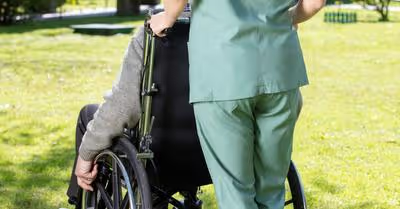Table of Contents
What is Assisted Living?
Assisted living is a form of residential care for people who are no longer able to live alone, but who still want to maintain an active and social lifestyle. Assisted living residents often need some assistance with daily tasks like bathing, dressing, and meal preparation. They also typically do NOT need round-the-clock nursing care.
These facilities usually offer different floor plans for residents to choose from, and they can range from one-bedroom apartments to condos and duplexes with multiple bedrooms and small yards. Most of them offer at least a kitchenette, and many have a full kitchen so residents can prepare their own meals.
Still, they’ll also have a central dining area so that the residents don’t have to cook if they don’t want to or are unable to. They’ll also provide organized social activities and events for their residents so that they stay active and socially engaged. These even include outings to local events and attractions.
Transportation services ensure that they have no trouble getting to doctor's appointments or the grocery store, and they can also help with medication management. Housekeeping will keep their homes spotless and their lawns maintained for them. It’s like a cross between an apartment complex, a hotel, and a dorm, with amenities tailored to senior citizens. As such, it really does represent one of the best, most enjoyable ways for seniors to live.
What are the pros and cons of Assisted Living?
Pros
Assisted living has a lot going for it. The housekeeping, meal service, and transportation services are some of the biggest pros. These are necessary daily tasks that many seniors are no longer comfortable or capable of handling for themselves. Meal service, in particular, is a big one. Malnutrition is a more common problem among seniors than most people realize. Either they lack the energy, strength, and dexterity to cook for themselves, or they simply don’t know how to cook for themselves.
Assistance with daily tasks is also a major pro of assisted living. Many of the residents need help with things like bathing, getting dressed, and managing their medications. In an assisted living facility, there is always help on hand to ensure that these tasks are completed safely.
An assisted living facility allows most seniors to retain more of their independence in their golden years than they would otherwise have. It also allows them to be quite comfortable. They rooms they live in are furnished with their own furniture, and they bring their own decorations, pictures, etc. It really is like renting their own apartment or townhome, just with more help available to them when they need it.
Cons
The biggest con of assisted living is the cost. The average cost of assisted living in the United States is $4000 per month. While that includes the cost of meals, transportation, and utilities, it’s still not cheap, and many families struggle to come up with that kind of money.
It’s also not for everybody. It can’t provide the care that patients with Alzheimer’s or dementia need, and there isn’t round-the-clock nursing care like there is in a nursing home.
As you can see, we think there are more pros than cons to assisted living. When the time comes, it’s usually the right choice.
Are residents of Assisted Living facilities happy?
Overwhelmingly so, yes. Assisted living facilities in the United States have a 93% satisfaction rate among their residents and the families of their residents. If you tour the facilities in your area, you’ll see why.
These are comfortable facilities where the residents feel at home, and know that they’re safe. All of the standard household chores like cleaning and cooking are done for them, they have a lot of independence, and there are plenty of social activities to keep them entertained.
The quality of life for almost all residents who move into an assisted living facility increases after they move in. They find that they spend a lot less time alone, and they spend a lot less time worrying about their safety.
For many of them, they find their their nutrition and hygiene are much better once they’ve moved in to an assisted living facility, because they now have plenty of help with meals, bathing, laundry, and keeping their clothes clean. At the same time, they don’t feel any loss of dignity, because they’re still able to do their own shopping, cook for themselves (if they want to), spend their time as they see fit. It’s one of the best ways for seniors to spend their golden years.
Can’t I just take care of my loved ones myself?
It’s common for families to feel a sense of guilt about moving their parents or grandparents into an assisted living facility. Often they feel like they’re letting their loved ones down, and that it would be somehow better if they could simply take care of them on their own.
The reality is that most people simply can’t provide the kind of care that an assisted living facility can. Most of us have neither the time nor the skills to help our loved ones bath regularly, manage their medications, and transport them to social events. At the very least, we don’t have the ability to do those things as often as an assisted living facility can. Especially not since most of us have jobs, families, and children that also demand our attention and our energy.
So, no, you likely can’t care for your loved one yourself, at least not as well as an assisted living facility can do it. And, if we’re being honest, many seniors would prefer not to have their own children and grandchildren helping them bath, or get dressed, or provide their meals. They feel that they maintain more of their dignity when these services are provided by paid professionals.
You should never feel guilty about moving your loved ones into an assisted living facility. Rest assured that these facilities can do a much better job than you could, and will provide a very high quality of life for their residents.
How to Know When it’s Time for Assisted Living
Almost all residents of assisted living facilities are satisfied with their quality of life, and many of them made the choice to move into assisted living on their own. That’s not true for everyone, though, and you may have your work cut out for you if you have to convince your loved one to move into assisted living.
It can be difficult to know for sure that it’s time to make the move, too. While it’s different for everyone, some of the most common and clear signs that it’s time for assisted living are:
- At least one fall in the last year, whether it resulted in injury or not
- Difficulty walking around the house
- It’s becoming difficult to prepare meals
- You notice signs that their nutritional needs aren’t being met, or they’re hungry all the time
- They need assistance with activities of daily living
- You find yourself worrying about their safety, or you think they seem isolated and lonely
If you or a loved one have experienced any of these things, it’s time for assisted living. It’s better to make the move now, before serious problems arise, than to wait until it becomes painfully obvious that living alone isn’t an option anymore.
Frankly, you can (and perhaps should) move into an assisted living well before you notice or experience any of these signs. Many assisted living facilities only require that residents be over a certain age (usually 65 or 70) to live there. As long as you meet the age requirement and you can pay the rent, you’re welcome in their facility. And, as long as you meet the age requirement and you can afford the rent, you’ll probably find that you’re happier there than you were when you lived alone.
Recent Articles
















